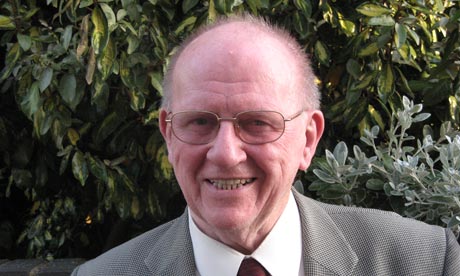
Gordon Colling bolstered Neil Kinnock’s position as Labour leader in the 1980s and early 90s
Gordon Colling, who has died aged 78, was a trade unionist, Bedford Labour politician and housing activist. However, his greatest contribution to Labour came as a member of the party's National Executive Committee from 1985 to 1995 – the years when Neil Kinnock was fighting to bring the party back after its heavy electoral defeat in 1983, and Gordon was "whip" and then "leader" to the NEC's moderates.
Gordon was born in Sunderland, where both his parents had been Labour councillors. He worked as a linotype operator, did national service in the RAF, and was awarded a scholarship to Ruskin College, Oxford. A car accident in 1960 left him with a permanent limp. He joined the staff of his union, the Typographical Association, in Manchester, and in 1965 followed its amalgamations to Bedford when the National Graphical Association was established.
His background inevitably drew him into Labour activism – secretary of the trades council, constituency secretary, borough councillor and then group leader. In February 1974 he stood as parliamentary candidate for Bedford.
In a welcome surprise to him, Labour's failure to win the seat in the first of that year's general elections proved not to be the pinnacle of his political career. After he was approached by trade unions to join the moderate slate for the NEC, the left mistakenly also included him on their slate. Narrowly elected at the outset, by his final year he was chair.
These were turbulent times for Labour, from the expulsion of Militant to the election of Tony Blair as leader. In 1985 Kinnock had no clear majority on the NEC, with the left often in a majority and the right – not obvious Kinnockites – deeply distrusting him.
However, Gordon believed in the good sense of union members and a faith that his party could right itself. As whip for the moderates, he sat patiently on the phone every Sunday afternoon, pacifying and cajoling. He gained their loyalty, and their support played a pivotal role in strengthening Kinnock's position. By the 1987 election, Gordon was leading the group and was one of Kinnock's closest confidants.
While on Labour's governing body he helped to improve the party's finances dramatically and took a lively interest in campaigns. Gordon was passionate about the role of unions within Labour – he once took on Blair on employment rights – and was concerned that a move from block voting to one member, one vote for party decision-making would diminish its working-class voice.
Having listened, Gordon would always tell the truth as he saw it. He is survived by a son, Trevor, a daughter, Dawn, six grandchildren and his partner of 11 years, Kay Burley. Gordon's wife, Janet, died in 1991.
Gordon was born in Sunderland, where both his parents had been Labour councillors. He worked as a linotype operator, did national service in the RAF, and was awarded a scholarship to Ruskin College, Oxford. A car accident in 1960 left him with a permanent limp. He joined the staff of his union, the Typographical Association, in Manchester, and in 1965 followed its amalgamations to Bedford when the National Graphical Association was established.
His background inevitably drew him into Labour activism – secretary of the trades council, constituency secretary, borough councillor and then group leader. In February 1974 he stood as parliamentary candidate for Bedford.
In a welcome surprise to him, Labour's failure to win the seat in the first of that year's general elections proved not to be the pinnacle of his political career. After he was approached by trade unions to join the moderate slate for the NEC, the left mistakenly also included him on their slate. Narrowly elected at the outset, by his final year he was chair.
These were turbulent times for Labour, from the expulsion of Militant to the election of Tony Blair as leader. In 1985 Kinnock had no clear majority on the NEC, with the left often in a majority and the right – not obvious Kinnockites – deeply distrusting him.
However, Gordon believed in the good sense of union members and a faith that his party could right itself. As whip for the moderates, he sat patiently on the phone every Sunday afternoon, pacifying and cajoling. He gained their loyalty, and their support played a pivotal role in strengthening Kinnock's position. By the 1987 election, Gordon was leading the group and was one of Kinnock's closest confidants.
While on Labour's governing body he helped to improve the party's finances dramatically and took a lively interest in campaigns. Gordon was passionate about the role of unions within Labour – he once took on Blair on employment rights – and was concerned that a move from block voting to one member, one vote for party decision-making would diminish its working-class voice.
Having listened, Gordon would always tell the truth as he saw it. He is survived by a son, Trevor, a daughter, Dawn, six grandchildren and his partner of 11 years, Kay Burley. Gordon's wife, Janet, died in 1991.
No comments:
Post a Comment